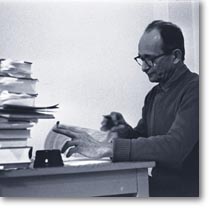| [Verbatim trial transcripts | David Irving's "Radical's Diary" für Jan.: 28 | 31 | Feb: 1 | 2 | 3 | 5 | 7 | 8 | 10 | 15 | 16 | 17 | 20 | 24 | 28 | Mar: 1 | 2]
Washington, Wednesday, March 1, 2000 Israelis Release Eichmann's Memoirs Nazi Executed 38 Years Ago Described Shock at Witnessing Mass Killing of Jews
By Lee Hockstader JERUSALEM, Feb. 29--Adolf Eichmann, Hitler's "technician of death" and an important cog in the Nazi killing machine, insisted in his jailhouse memoirs that he had nothing against Jews. In fact, he wrote, his stepmother even had Jewish relatives.
While the memoirs shine little new light on the history of the Holocaust, they do add some grotesque personal touches: At one point, the senior SS officer who arranged for hundreds of thousands of Jews to be transported to their deaths describes himself as so shocked at witnessing a group being machine gunned that he drank himself into a stupor. Eichmann, who was kidnapped by Israeli agents in Argentina in 1960 and brought to trial in Israel the next year, wrote that the Holocaust "was the most enormous crime in the history of mankind." He portrayed the logistics of the Nazis' Final Solution as the "gruesome workings of a death machine; gear meshed with gear, like clockwork." He said he felt compelled to give his account "because I have seen hell, death and the devil, because I had to watch the madness of destruction, because I was one of the many horses pulling the wagon and couldn't escape left or right because of the will of the driver." Despite the passage of time, the disdain of historians and Eichmann's exhaustive testimony at his trial, the testament still touched a nerve in Israel, which kept the manuscript under lock and key for 39 years. The few historians who had access to the memoirs have sneered at their content. The manuscript includes not only Eichmann's denial of his hatred for Jews, but also extensive passages in which he portrays himself as a family man who loved nature and children. "The impression one gets is that he's a liar," said Yehuda Bauer, a leading Holocaust historian. "There's nothing new in it." Nonetheless, other Holocaust scholars argue that Israel, which has insisted that other countries open their archives of Holocaust materials, should have released the manuscript long ago. "It's immensely important to understand the man," said Tom Segev, a journalist and historian who has written extensively about the Holocaust. Writing in an Israeli jail cell as he awaited the outcome of his trial, Eichmann included intricate instructions for what he evidently imagined would be prompt publication of his work. He asked that the book's cover be pearl-colored and that his editor bear in mind the Bavarian idioms of his German. He left instructions that his wife get 10 copies, which she was to distribute to specified friends and relatives "in the name of my husband, with friendly regards." Eichmann, who headed the Gestapo's Jewish Office, titled the manuscript "False Gods," a reference to his supposed disillusionment with the Nazis. However, in an interview with a Dutch fascist journalist [Wim Sassen] five years before his capture, Eichmann expressed no fondness for Jews or remorse for the Holocaust. Rather, he said he regretted that the Nazis had not been tougher executioners and was sorry the Jews had established a state of their own. At the time of Eichmann's hanging, the memoirs were ordered sealed in the Israeli state archives by then-Prime Minister David Ben-Gurion, who feared their publication might blur focus on the former Nazi colonel's conviction and execution. For decades after that, the document was all but forgotten. The government released it today in response to a request by an American professor, Deborah Lipstadt of Emory University in Atlanta, who is fighting a libel action in England by a British historian she has accused of denying the Holocaust. The historian, David Irving, has drawn attention for writing that the scope of the Holocaust has been somewhat exaggerated and for arguing that there is no documentary evidence that Hitler knew about the liquidation of European Jewry until late in World War II. Lipstadt wrote that Irving is a "dangerous spokesman" for Holocaust denial, and Irving sued her for libel. When Lipstadt's defense team requested the Eichmann manuscript, Israel obliged. The Jewish state is duty-bound "to help those who are fighting the denial of the Holocaust," Attorney General Elyakim Rubinstein said Monday, explaining his decision. "If the diary of this despicable person is one of the links in this chain, there is no reason that it shouldn't be available to the public." Israeli journalists have pressed for release of the Eichmann document for several years, but until now Israeli officials balked. They worried about a lawsuit from Eichmann's family if it were published in Israel, but were reluctant to hand it over to Eichmann's sons for fear they would profit from it. Last summer, officials said they intended to have the
manuscript published as a scholarly text in Germany,
complete with footnotes and annotations. But Lipstadt's
request hastened the release, and Israeli officials said
they hoped it will help her defense against
Irving.
| |
Wednesday March 1, 2000 |

 Eichmann's
manuscript--1,200 pages of flow charts, revisions,
ruminations and self-justifications written in antiquated,
nearly illegible longhand--was made public today, nearly
four decades after he was abducted, tried and hanged by
Israel for his role in the Third Reich's extermination of 6
million European Jews.
Eichmann's
manuscript--1,200 pages of flow charts, revisions,
ruminations and self-justifications written in antiquated,
nearly illegible longhand--was made public today, nearly
four decades after he was abducted, tried and hanged by
Israel for his role in the Third Reich's extermination of 6
million European Jews.